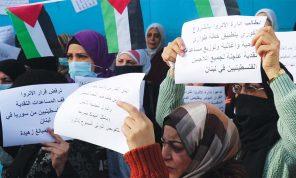The exacerbation of the living crisis pushes thousands of Lebanese to migrate cities to villages and rural people keywords
The economic crisis and the collapse of the living conditions in Lebanon prompted thousands of citizens to migrate cities and return to the countryside and villages from which they left during the previous decades, in search of job opportunities or to escape the Israeli bombing that was targeting villages and towns in southern Lebanon and the western Bekaa for many years.The number of Lebanese who abandoned cities to villages and countryside has increased during the past few months, after living crises worsened and the Lebanese lira lost its purchasing value, in addition to the high prices, power outages, loss of medicines and car fuel from the markets.Reports indicate that the closure of hundreds of productive institutions and commercial companies in various Lebanese cities, led to an increase in the number of unemployed, which prompted a large number of citizens with their families to return to the villages.And if the reason for the Lebanese people's migration from villages to cities during the sixties and seventies of the last century is to search for job opportunities, then the recent living crisis, which has exacerbated during the past few months, led them to domestic migration from the city to the village.Since the year 2019, Lebanon has suffered from political, financial, economic and health crises, and from the deterioration of an escalating living, the collapse of the value of the national currency, the erosion of the savings income, in addition to the escalation of unemployment and poverty and the decline in people's purchasing capabilities with the high prices of consumer goods.And if 74 percent of the Lebanese suffer from poverty based on the recent report of the United Nations, the main social social index of the displacement of the Lebanese from the city to the countryside showed that the level of living in the capital Beirut is always 30 percent higher than in the villages.In the context, the Lebanese Ministry of Labor estimates in cooperation with the International Labor Organization indicated that unemployment rates in Lebanon have increased from 11.3 percent in 2018 to 18.5 percent in 2019 and then jumped to 36.9 percent in 2020 and will reach 41.4 percent at the end of the current year 2021 as well as in the absence of any rapid and serious procedural solutions, to confront the accelerating economic crisis in inflation, the poverty rate in Lebanon increased to more than 50 percent..The statistics of the National Social Security Fund in Beirut also clarified that from the beginning of the year 2020 until the second half of 2021, 40 thousand workers came out of the labor market, and that this number is a candidate for the rise..According to these statistics, the Lebanese "International Information" in Beirut concluded that the percentage of returnees to villages and rural areas ranges between 5 and 7 percent of the population in those villages.The number of residents of villages and countryside was estimated at 25 percent of the Lebanese, or about 1.1 million Lebanese, and concluded that the number of returnees ranges between 55 and 77 thousand individuals.
Reverse displacement

وكانت «الدولية للمعلومات» وهي شركة دراسات وأبحاث وإحصاءات علمية مستقلة، قد أعلنت في دراسة أعدتها حول «الهجرة العكسية من المدينة إلى الريف» إلى عدم وجود رقم دقيق للعائدين من المدن إلى الأرياف، فيما باتَ ما يعرف بـ«Reverse displacement» موضحة أنه من الممكن رَصد ذلك من خلال عينات في عشرات القرى.The study pointed out that these numbers are likely to increase with the intensification of the economic crisis, the spread of unemployment and the high cost of living in cities compared to villages and countryside.وفي تفسيرها لظاهرة «Reverse displacement» في لبنان، جاء في دراسة «الدولية للمعلومات» أن «الأزمة الاقتصادية وما سببَته من بطالة وإغلاق للمؤسسات وتراجع للخدمات العامة بدلت اتجاه النزوح من الأرياف إلى المدن، ودفعت ببضعة آلاف من الأسر للعودة إلى قراها، ولا سيما الأفراد الذين فقدوا عملهم».The study considered that in villages free family housing may be available or a lower cost of cities, and job opportunities may be available in the fields of simple industries, agriculture or sale in small stores, with the possibility of obtaining some foodstuffs at a lower cost..In this context, the researcher Muhammad Shams al -Din confirms that Lebanon has historically witnessed a displacement from the countryside to the capital and the major cities where the services and job opportunities that are often not present in villages and rural areas are available, but what happened since the beginning of the current crisis witnessed by Lebanon, specificallySince the beginning of last year, in light of economic crises, lack of job opportunities and high costs.ويتوقع الباحث شمس الدين، في حال استمرار الأزمة الاقتصادية وتفاقمها أكثر، أن ترتفع نسبة النازحين من المدن الى الأرياف في الأشهر المقبلة، بعد أن أصبح هذا Reverse displacement ظاهرةً كبيرة.He explains that job opportunities, although they are not available in these villages, are that the costs of living are cheaper, where the housing is available and there is no need to rent a house, as well as that water, electricity, education and other services are available in the villages.Shams al-Din determines two influencing workers on the displacement from the countryside to the cities and Bata are not now available, as follows:-The main reason is job opportunities, while unemployment is now equal between the city and the countryside, and this factor is a limit of displacement from the countryside towards the city.-دخول عامل ثاني إيجابي متوافر في الريف، أدى إلى Reverse displacement، وهو أنّ تكاليف الحياة في المدينة أغلى من تلك في القرى، حيث أنّ المواطن يمتلك مسكناً في قريته أو أنّ كلفة استئجار منزل في القرية أقل بنحو 50 في المئة من كلفة الإيجارات في المدينة.
Putting of unemployment
In a poll of the opinions of the Lebanese who abandoned the city towards the village, it was found that their migration was either because of the loss of their work or as a result of the difficulty that the nature of life in the city reached.Hussein Fouani, 36, was working in an accountant in an import and export company. The company closed its doors after the Beirut port on 4 August 2020, aggravated the economic crisis and disbursed its employees..ومنذ صرفه من عمله، بذل فوعاني جهودا مضنية لإيجاد فرصة عمل أخرى، وبعد أن عجز عن إيجاد عمل له غادر بيروت وتوجه للإقامة في قرية علي النهري في البقاع التي غادرها قبل عشرة أعوام، وقال لـ«القدس العربي»: «عدت إلى قريتي ومنزل أهلي، هربا من Putting of unemployment وتردي الوضع المعيشي وتكاليف الحياة وصعوبتها في العاصمة بيروت».He added, “Since August 2020, I have been looking for a job opportunity in Beirut, to be able to secure a livelihood for my children, and I did not find work, and after the power, medicines, car fuel and crazy height at food prices, and the burdens of housing in cities, especially in Beirut, are no longer to be energy.And we only live in villages and mountains with plants and pets.As for living in cities, it has become difficult due to the decline in services, the power outages, the sharp shortage of water and fuel, the high cost of living and food needs ».In response to a question, "What will you do to secure the costs of life and the livelihood of children in the village?"He replied, "I will work on planting vegetables and raising livestock and birds.".As for Elie Labbis, 43, he was working as an employee in a Lebanese bank in the city of Sidon, the conditions of life forced him to return to his village, after the bank closed its doors and expelled the employees, he became unemployed, and he was no longer able to bear the costs of living in the city yet If the prices rose and the life conditions exacerbated, explaining the wearing of his harsh conditions, as he described it to "Al -Quds Al -Arabi", saying: "I returned with my family to the village of Al -Adoussi in which I was born and left more than 10 years ago to be close to my workplace in the city of Sidon, I returned to the village after I was narrowed We have life in the city, especially since the village is an appropriate environment and has a simple life, and it contains family and relatives and also the costs of life in it are not high as in the city »».He considered that in rural areas, sustenance can be collected from work in agriculture, livestock and poultry education.He concluded by saying, in the villages, the heads of the earth abound from food plants, and it is possible to dispense with home gas in firewood and bread of ovens with a bread.He pointed out that housing in the countryside is better than housing in cities, where psychological comfort, open air and social rapprochement are available.
Sectarian slogans
In the context, the professor of social sciences at the Lebanese University, Dr. Ahmed Jumaa, saw that there are reasons that give preference to a village life in Lebanon, especially in light of a broad economic collapse that led to a 50 percent unemployment of the workforce and the disruption of the employees of graduates, and the high cost of housing in the cityAnd the crises that follow it in the availability of energy and fuel.Dr. Jumaa told Al -Quds Al -Arabi in light of the decline in incomes, life in the village becomes better, indicating that the cost of residency in the major cities of the family is minimal from 10 to 12 million pounds per month distributed over a quarter of the amount of energy, and a second quarter of the transportation and the second half remainingDistributing health, food, food, drink, and payment of school installments.He added that living in the countryside is less expensive than in the city by 30 to 40 percent, and considered that the phenomenon of counter -migration from the city to the village, perhaps on its way to exacerbation in the future in Lebanon."I and my family returned to the village of Halba, northern Lebanon, after the costs of life became inaccurate, and I could no longer secure a decent life for my family," said Ahmed Mansour, who is a family head..The Mansour family was living in Beirut, and with her return to the village, she managed to provide a transportation allowance as well as the cost of living, as many consumer materials cost them less in the village..Mansour notes to "Al -Quds Al -Arabi" that life in villages and rural areas is easier, materially, psychologically and healthy, and better than housing in Beirut.He said, in the village and the countryside, the land can be cultivated, and children can get to know the nature of the nature, but for the monthly expense, Mansour indicates that it decreased to half, and he continued, "I do with all vitality and activity to work in the soil and cultivate cucumber, cabbage, tomatoes, films and thyme.Every day I contemplate the seedlings, their growth, and water it in a pampering, and I am waiting for its fruits..ويشرح عن وجود سبب مختلف لقرارات هروب الناس إلى الريف، وهو «ظهور Sectarian slogans والهتافات ذات الطابع الطائفي التي تدفع الناس، وإنْ لا شعورياً، إلى العودة لتأمين نوع من الحماية في إطار الاحتماء بالعصب الطائفي، مثل السكن، أو في مناطق متجانسة، ما يوفّر لهم حماية أمنية نوعاً ما».Many reasons prompted thousands of Lebanese and their families to leave cities to villages and countryside, and one of the most prominent of these motives was the general collapse of living and the escalation of political and economic crises in the country in light of the anxiety and panic that began to control most of the Lebanese from the future they see as dark.










